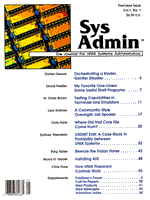
Listing 1: pwexp.pl
#! perl
eval '(exit $?0)' && eval 'exec perl -S $0 ${1+"$@"}'
& eval 'exec perl -S $0 $argv:q'
if 0;
#
# pwexp.pl - PERL program to check for password expiration times
#
#
#
# get the passwd file entry for this account. $< is the numerical
# representation of our REAL UID
#
( $username, $passwd, $uid, $gid, $pwage,
$comment, $gcos, $dir, $shell ) = getpwuid($<);
#
# If passwd aging value is defined
#
if ( $pwage ne "" )
{
#
# extract the maxweeks value
#
$maxweeks = &a64l( substr( $pwage, 0, 1 ) );
#
# extract the minweeks value
#
$minweeks = &a64l( substr( $pwage, 1, 1 ) );
#
# extract the last changed value
#
$lastchange = &a64l( substr( $pwage, 2 ) );
#
# what is NOW?
#
$now = time / 604800;
#
# If maxweeks < minweeks, the user can't change his passwd
#
if ( $maxweeks < $minweeks )
{
printf "You cannot change your password. Ever. \n";
}
#
# The special case where the password must be changed
#
elsif ( ( $minweeks == 0 ) && ( $maxweeks == 0 ) )
{
printf "You must change your password. Now.\n";
}
#
# if lastchanged is > now, then expired
# if now > lastchanged + maxweeks, then expired
#
elsif ( $lastchange > $now ||
( $now > $lastchange + $maxweeks ) &&
( $maxweeks > $minweeks ) )
{
printf "Your password has expired.\n";
}
#
# tell the user when his password expires
#
else
{
printf "Your password expires in %d weeks.\n",
$lastchange + $maxweeks - $now;
printf "Please start thinking of a new one.\n";
}
}
else
{
printf "Password aging is not enabled.\n";
}
exit(0);
#
# the a64l routine was written by Randall Schwartz after a call for help
# in the comp.lng.perl newsgroup. Thanks Randall!
#
sub a64l {
local($_) = @_; # arg into $_
die "a64l: illegal value: $_" unless m#^[./0-9A-Za-z]{0,6}$#;
unless (defined %a64map) {
@a64map{'.','/',0..9,'A'..'Z','a'..'z'} = 0..63;
}
local($result) = 0;
for (reverse split(//)) {
$result *= 64;
$result += $a64map{$_};
}
$result;
}
|